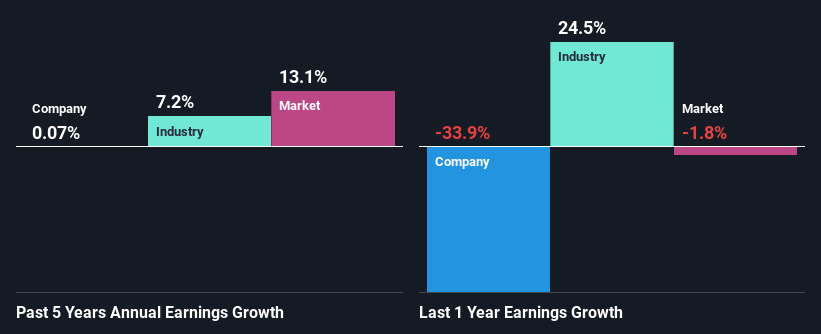Can Park Aerospace Corp.'s (NYSE:PKE) Weak Financials Pull The Plug On The Stock's Current Momentum On Its Share Price?
Park Aerospace (NYSE:PKE) has had a great run on the share market with its stock up by a significant 10% over the last week. We, however wanted to have a closer look at its key financial indicators as the markets usually pay for long-term fundamentals, and in this case, they don't look very promising. Specifically, we decided to study Park Aerospace's ROE in this article.
Return on equity or ROE is an important factor to be considered by a shareholder because it tells them how effectively their capital is being reinvested. In short, ROE shows the profit each dollar generates with respect to its shareholder investments.
View our latest analysis for Park Aerospace
How Is ROE Calculated?
The formula for ROE is:
Return on Equity = Net Profit (from continuing operations) ÷ Shareholders' Equity
So, based on the above formula, the ROE for Park Aerospace is:
6.3% = US$6.9m ÷ US$110m (Based on the trailing twelve months to September 2024).
The 'return' is the income the business earned over the last year. Another way to think of that is that for every $1 worth of equity, the company was able to earn $0.06 in profit.
What Has ROE Got To Do With Earnings Growth?
So far, we've learned that ROE is a measure of a company's profitability. Depending on how much of these profits the company reinvests or "retains", and how effectively it does so, we are then able to assess a company’s earnings growth potential. Assuming all else is equal, companies that have both a higher return on equity and higher profit retention are usually the ones that have a higher growth rate when compared to companies that don't have the same features.
Park Aerospace's Earnings Growth And 6.3% ROE
At first glance, Park Aerospace's ROE doesn't look very promising. Next, when compared to the average industry ROE of 14%, the company's ROE leaves us feeling even less enthusiastic. Hence, the flat earnings seen by Park Aerospace over the past five years could probably be the result of it having a lower ROE.
Next, on comparing with the industry net income growth, we found that Park Aerospace's reported growth was lower than the industry growth of 7.2% over the last few years, which is not something we like to see.

Earnings growth is a huge factor in stock valuation. The investor should try to establish if the expected growth or decline in earnings, whichever the case may be, is priced in. This then helps them determine if the stock is placed for a bright or bleak future. If you're wondering about Park Aerospace's's valuation, check out this gauge of its price-to-earnings ratio, as compared to its industry.
Is Park Aerospace Making Efficient Use Of Its Profits?
Park Aerospace's very high three-year median payout ratio of 105% suggests that the company is paying its shareholders more than what it is earning. This does go some way in explaining the negligible earnings growth seen by Park Aerospace. Paying a dividend beyond their means is usually not viable over the long term. This is indicative of risk. To know the 2 risks we have identified for Park Aerospace visit our risks dashboard for free.
Additionally, Park Aerospace has paid dividends over a period of at least ten years, which means that the company's management is determined to pay dividends even if it means little to no earnings growth.
Conclusion
Overall, we would be extremely cautious before making any decision on Park Aerospace. The low ROE, combined with the fact that the company is paying out almost if not all, of its profits as dividends, has resulted in the lack or absence of growth in its earnings. So far, we've only made a quick discussion around the company's earnings growth. So it may be worth checking this free detailed graph of Park Aerospace's past earnings, as well as revenue and cash flows to get a deeper insight into the company's performance.
Have feedback on this article? Concerned about the content? Get in touch with us directly. Alternatively, email editorial-team (at) simplywallst.com.
This article by Simply Wall St is general in nature. We provide commentary based on historical data and analyst forecasts only using an unbiased methodology and our articles are not intended to be financial advice. It does not constitute a recommendation to buy or sell any stock, and does not take account of your objectives, or your financial situation. We aim to bring you long-term focused analysis driven by fundamental data. Note that our analysis may not factor in the latest price-sensitive company announcements or qualitative material. Simply Wall St has no position in any stocks mentioned.
 Index Options
Index Options CME Group
CME Group Nasdaq
Nasdaq Cboe
Cboe TradingView
TradingView Wall Street Journal
Wall Street Journal